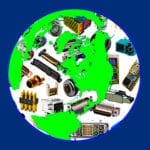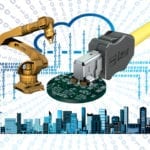M12 Connectors Provide Rugged Performance for Industrial Ethernet
In traditional office environments, Ethernet connections are typically made using the standard RJ45 connector. However, when Ethernet migrates to industrial environments, a wide range of contaminants come into play, making M12 connectors a more durable choice.
Ethernet first came into use in computer networking technologies in the 1980s, providing communications on local and wide area networks via coaxial cable. Modular RJ45 connectors on both ends of the cable made a physical link between machines in the network. It was first standardized as IEEE 802.3. Since then, it been refined to support higher bit rates, twisted pair cable, and fiber optic links, and Ethernet has expanded beyond office environments into industrial settings, such as manufacturing and automated test facilities where noise, solids, liquids, and gases pose a threat of contamination and signal disruption. In industrial environments, standard RJ45 connectors do not offer adequate protection. Instead, industrial-grade connectors and connection systems are required. The primary solution typically involves encasing or shrouding the standard RJ45 in either a plastic or metal housing, depending on the application and required durability. However, M12 connector solutions have been increasing in popularity as well and offer an array of unique benefits.
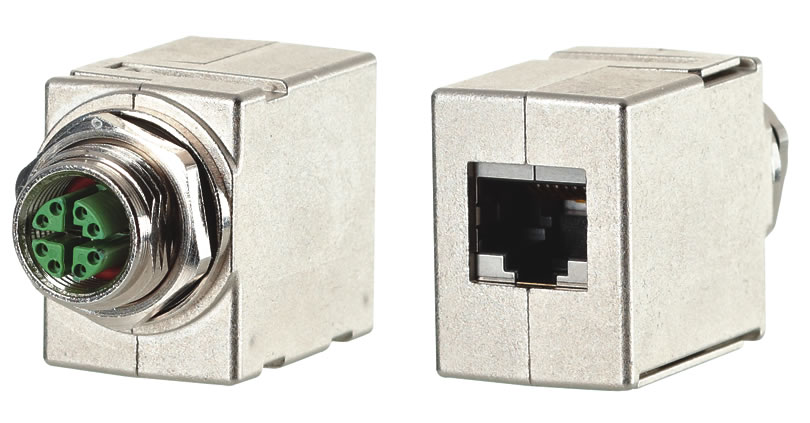
IP67 Industrial Ethernet M12 X-code to RJ45 panel feedthrough
A connection system’s resistance to contaminants is rated for specific ingress protection (IP) by the International Electrotechnical Commission (IEC). Connectors with an IP67 rating provide adequate protection in even the harshest environments. The first digit in that rating represents the resistance against solids. In this case, that resistance is 6, the highest classification, which means a connector is dust-tight or impervious to solids. The second digit represents resistance to liquids. A rating of 7 means the connection system can be submerged in one meter of water for up to one hour before leaking and can also resist moderate pressure water spray. An IP67 level of ingress protection can be achieved using many of today’s industrial-grade plastic housings. However, there are applications in which a metal solution is desired, especially when resistance to fire and even explosions is a concern. In these cases, solutions normally consist of die-cast zinc or nickel-plated alloy housings, which also provide complete protection from EMI.
Oil and gas exploration is one application area in which network connections are not only exposed to liquids and gas, but also ultraviolet light, extreme temperatures, mud, and severe handling. All of these influences can increase the likelihood of network failures. Only the highest grade industrial-strength connection systems will offer the protection required to maintain a working and reliable network connection in such an environment.
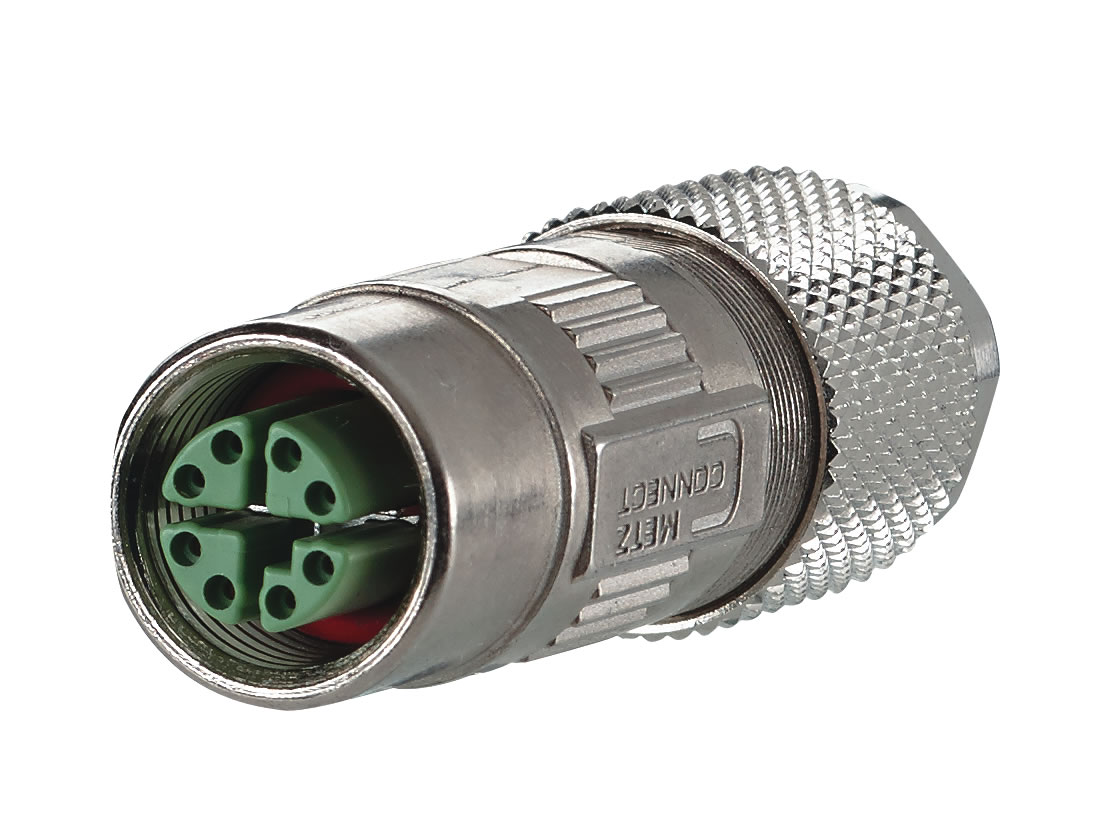
M12 X-code field plug
For example, in a top-drive control application, maintaining control and data signal transmission is imperative. This heavy and powerful piece of equipment is responsible for supplying the rotational force, or torque to facilitate the drilling of a well. It is also able to traverse vertically and is hydraulically actuated. Speed control, elevation, and line pressure are important parameters to monitor to ensure adequate safety on the drilling platform. In addition, keeping the rig from becoming inoperable is second only to safety. The only time a rig should be inoperable is during a scheduled shut-down, such as when repositioning for a new well. Start-up and shut-down may account for just a few percent of operating time, but it is during this time that many incidents can occur. One such incident involves the disconnection and subsequent reconnecting of data signal and control cables, as most electrical issues can be attributed to poor electrical contact.
In addition, as if the abusive handing from rig operators is not enough to consider, the connectors in top-drive control applications can become encrusted with mud, or even rolled over by heavy equipment if left dangling on the ground below. So, connectors must be ruggedized against these extreme-use conditions. Protective caps are available to protect unused or temporarily disconnected ports from contamination and quarter-turn, bayonet-style locking features can be used to facilitate quick connections while providing high-tensile-strength support to keep plugs from being pulled out of their receptacles.
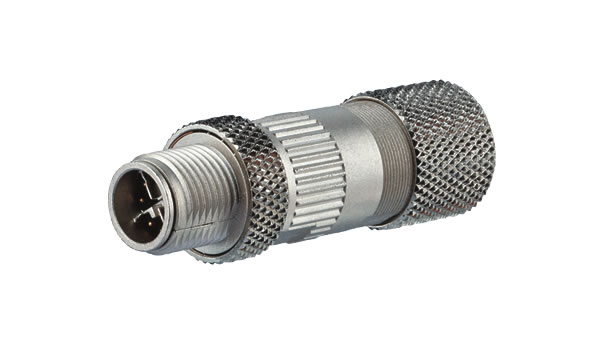
M12 X-code field plug
Industrial-grade M12 connectors are an increasingly popular choice for connecting devices used in industrial automation and control applications. From inception, M12 connectors were designed to address the need for data acquisition and control functions in harsh environments. Strengthening and sealing an RJ45 connector may provide a connection system comparable to that of an M12 connector in terms of its IP rating, but M12 connectors are inherently more robust and more compact than most RJ45-based systems. The attractiveness of the RJ45 based system comes from the lower upfront integration costs associated with plastic-based solutions, as well as their ability to handle open protocols such as TCP/IP. However, this begins to phase out once you consider metal-based options, and it is arguable which offers superior performance. M12 connectors were not necessarily designed with high-speed data transfer in mind. However, just as the RJ45-based industrial connectors have evolved to address the need for mechanical robustness and ingress protection, M12 connectors have been evolving to accommodate high-speed networks. Now, two-pair connectors can support data rates up to 100Mb/s and multiple developments designed to enhance the transmission performance of M12 connectors are currently underway.
Although M12 connectors provide superior protection and performance, these connectors don’t provide performance gains in office-type Ethernet applications, so RJ45 connectors will still remain in widespread use. Each of these connectors offers specific benefits in terms of cost, performance, durability, and longevity, so designers must thoughtfully evaluate the environmental conditions of individual Ethernet applications to make the best decision for each network.
By Michael Balekdjian, Application Engineer, METZ CONNECT USA Inc.
